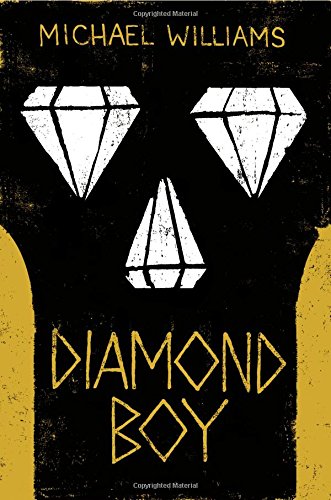 When fifteen year old Patson Moyo and his family head for the diamond fields of Marange in eastern Zimbabwe, Patson is sure that his family’s fortunes are about to change for the better. Even though Patson’s father plans to teach school in diamond country as he always has, Patson knows that there are diamonds for everyone in Marange. As soon as Patson finds his girazi, that special, costly diamond that everyone is looking for, he and his family will be set for life.
When fifteen year old Patson Moyo and his family head for the diamond fields of Marange in eastern Zimbabwe, Patson is sure that his family’s fortunes are about to change for the better. Even though Patson’s father plans to teach school in diamond country as he always has, Patson knows that there are diamonds for everyone in Marange. As soon as Patson finds his girazi, that special, costly diamond that everyone is looking for, he and his family will be set for life.
If you just read the article on Wikipedia about the Marange diamond fields, you will know that Patson’s story probably won’t have a happy ending. In fact, although the events in the course of Patson’s adventure are harrowing, violent, and frightening, the story does contain more hope than perhaps the facts warrant.
From Wikipedia and linked sources:
“The government launched police crackdowns against illegal miners and smugglers several times since December 2006. Up to 150 of the estimated 30,000 illegal miners were shot from helicopter gunships.”
(2009) “The Zanu-PF government has mulled plans to forcibly move nearly 5 000 families from Chiadzwa area to facilitate the plundering of diamonds. The families are to be dumped at an Arda farm in Odzi as the President Robert Mugabe-led government intensify looting of the precious minerals.”
“The BBC, the British state broadcaster, claims Zimbabwe’s security forces have a torture camp in the Marange diamond fields; methods include severe beatings, sexual assault and dog mauling according to alleged victims.”
“A 2012 study . . . found that operations at the diamond fields are releasing dangerous chemicals into the Save River.”
“Human Rights Watch says while it has seen an improvement in Marange, it also believes questions remain over who is involved in running these mining companies.” CNN, 2012.
Author Michael Williams, a South African writer and Managing Director of Cape Town Opera, has already written one book set in Zimbabwe, Now Is the Time for Running. Diamond Boy is a sort of companion novel to that earlier book, and some of the characters in Now Is the Time for Running show up in minor roles in Diamond Boy. As I intimated, Diamond Boy is a fascinating but shocking look at life in Zimbabwe, particularly the appalling effect of the possibility of sudden riches in a country filled with poverty and not much economic opportunity.
The ending to the story is unrealistic, but maybe necessary to make up for the unrelenting gloom, greed, and cruelty of the preceding pages. This book is not for younger teens, nor will it be for all readers, even if they have the maturity to handle the subject matter. No, the author doesn’t use graphic language or lurid description, but the events themselves are disturbing enough. Sensitive readers will be haunted, as I am, by the thought that the greed and brutality of man is still making life a living h— for many children and young adults around the world, even if, possibly, improvements have been made in operations at Marange.
Yes, I recommend this book for those who are interested in knowing about one of the horror stories of the twenty-first century, but I suggest you enter with prayer and exit with renewed compassion and more prayer.
